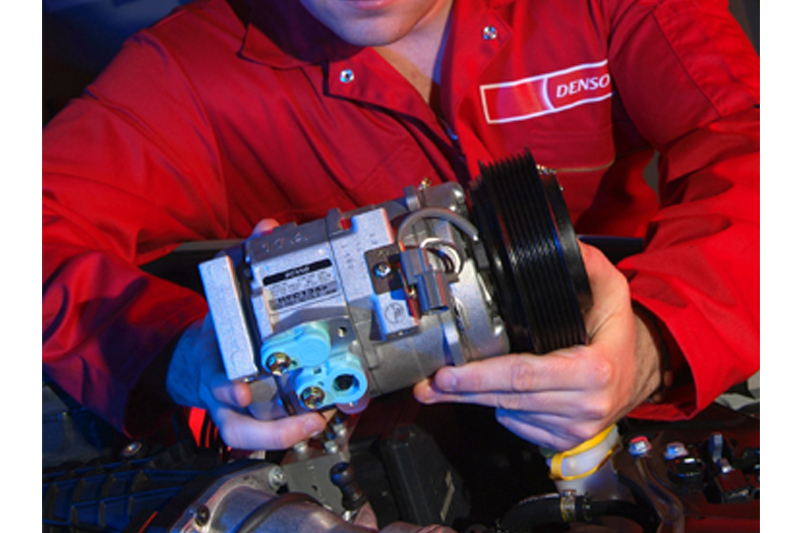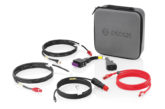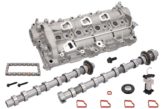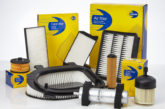
DENSO explains why technicians should consider the mechanism of a compressor, as well as the refrigerant it compresses, when making the crucial decision of which oil to use.
The compressor is one of the most important components within the air conditioning system, as it essentially drives the refrigeration cycle. In simplified terms, it draws the low- temperature, low-pressure gas refrigerant, which has been vaporised in the evaporator through the extraction of heat from the vehicle’s interior, compresses and sends the then high-pressure, high-temperature refrigerant into the condenser, where it changes from vapour to liquid.
Although they all fulfil the same function, there are several types of compressors, including reciprocating (piston) and rotary – and which one is fitted is broadly dependent on the age and, therefore, development of the air conditioning system in the vehicle.
The fixed displacement compressor, the oldest design, features a set swash plate that operates the pistons necessary to generate the throughput of gas, at a constant volume per rotation, so has to use a clutch pulley to allow it to, in effect, be switched on or off when the air conditioning is or isn’t required. Of a similar era is the through-vane compressor that also operates on a fixed output per rotation basis and therefore, likewise, employs a clutch pulley.
In a more modern vehicle, it is likely that a variable displacement compressor will be fitted, and these utilise a swash plate that can change its angle and increase or decrease the movement of the pistons and, hence, the flow rate. As a result, they do not need a clutch pulley, but instead use a fixed, damper limiter pulley with a built-in safety mechanism. This allows its internal parts to break, thus preventing the pulley from rotating the input shaft, should the compressor seize due to use of the incorrect specification of oil, for example.
Although less common, another rotary example is the scroll compressor, which features both a fixed and rotating scroll that produces a constant flow of gas and therefore does not incorporate suction or discharge valves, but does again rely upon a clutch pulley.
Finally, for electric vehicles, there is the e- compressor, which also utilises scroll technology, but rather than being driven by an auxiliary belt, it incorporates an electric motor that can be modulated on demand.
In addition to their function, the other common factor between these compressors is their requirement for lubrication, and contrary to the prevailing view that any compressor oil will do, the specification of the oil is, in fact, absolutely critical.
PAG 46 oil is the correct specification lubricant for both reciprocating and rotary compressors, although there are even differences with this designation, as the formulation will vary slightly depending on whether the system uses R134a or the newer, more environmentally-friendly, R1234yf refrigerant. PAG 100, on the other hand, is exclusively for through-vane compressors. POE oil is for e-compressors because the electric motor is cooled by the combination of the refrigerant and the oil, so the lubricant must be a non-electrically conductive insulator.
In short, there is no such thing as universal compressor oil, and instead its formulation depends on the mechanism the compressor employs and the refrigerant it compresses. Every DENSO compressor not only encompasses a notification to define its mechanism, but also states the lubricant required, which in some cases, such as its unique ND-Oil 8 formula, has been specially developed to meet the specific requirements of DENSO reciprocating and scroll compressors, which ordinary PAG 46 oil simply cannot attain.
However, as well as offering ND-Oil 8 and several other specific formulations, as a separate aftermarket part, every DENSO compressor is supplied with the correct specification oil, which ensures technicians can fit them with complete confidence.









